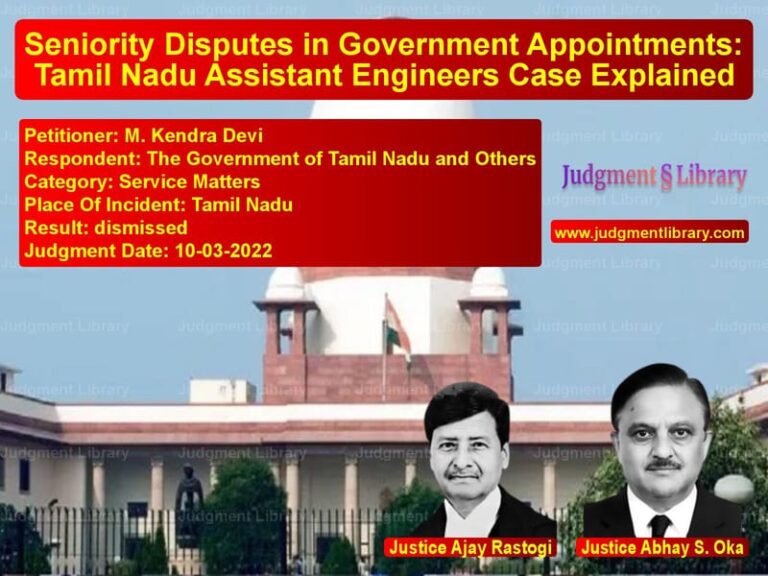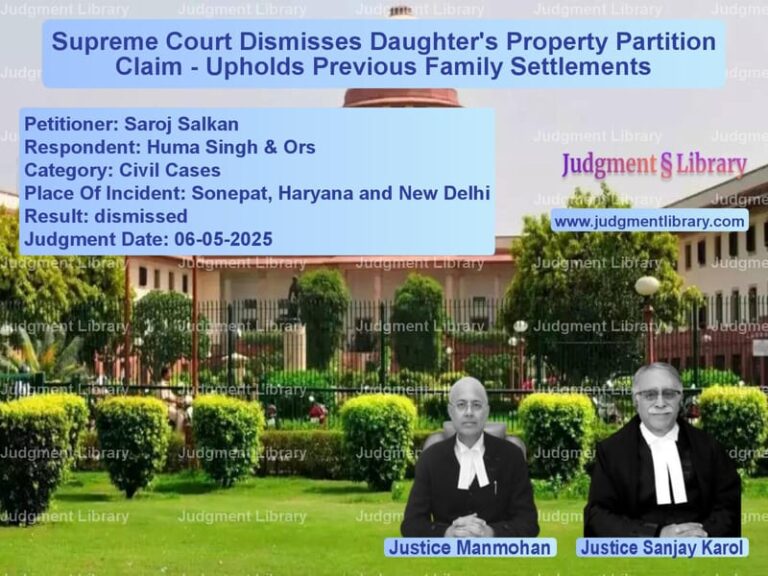Supreme Court Quashes Dowry Harassment Case: Key Takeaways from Rashmi Chopra v. State of Uttar Pradesh
The Supreme Court of India, in its judgment dated April 30, 2019, ruled on multiple criminal appeals involving allegations of dowry harassment, domestic violence, and criminal intimidation. The case, Rashmi Chopra & Ors. vs. The State of Uttar Pradesh & Anr., addressed a dispute arising from the marriage of Nayan Chopra and Vanshika Bobal. The Court set aside the summoning order issued by the trial court under Section 498A IPC and the Dowry Prohibition Act, while allowing proceedings under Sections 323, 504, and 506 IPC against one of the accused, Rajesh Chopra.
Background of the Case
The dispute began with the marriage of Nayan Chopra and Vanshika Bobal, which took place on April 15, 2012, in Noida. Soon after the marriage, the couple moved to the United States. By November 2013, the couple had separated, and on October 23, 2014, Nayan Chopra filed for divorce in the Circuit Court for the County of Kalamazoo, Michigan. The divorce was granted on February 24, 2016, settling issues of alimony, pension benefits, and division of assets.
Following the divorce proceedings in the U.S., Vanshika’s father, Indrajeet Singh, filed a criminal complaint in India on May 10, 2015, under Section 156(3) Cr.P.C., alleging harassment and dowry demands.
Key Allegations in the Complaint
- Vanshika’s family allegedly gave Rs.50 lakhs in gifts at the time of marriage, but the accused demanded an additional Rs.1 crore in dowry.
- On November 6, 2012, Vanshika’s in-laws insisted on a second marriage ceremony as per Punjabi traditions.
- On December 1, 2013, Nayan Chopra allegedly threw Vanshika out of their house.
- On November 8, 2014, Vanshika’s father was allegedly assaulted near Gurudwara, Sector 18, Noida, where his gold chain and Rs.60,000 were forcibly taken.
Trial Court’s Summoning Order
The trial court issued a summoning order on January 17, 2017, under Sections 498A, 323, 504, 506 IPC and Sections 3/4 of the Dowry Prohibition Act, based on the allegations.
High Court’s Decision
- The accused filed an application under Section 482 Cr.P.C., seeking to quash the complaint.
- The High Court of Allahabad dismissed the application, ruling that the trial court had sufficient grounds to proceed with the case.
Supreme Court’s Observations
- The Court ruled that the complaint lacked specific incidents and details necessary to substantiate allegations under Section 498A IPC and the Dowry Prohibition Act.
- It emphasized that cases under Section 498A IPC should not be used as a tool for harassment.
- The Court noted that the complaint was filed after divorce proceedings were initiated in the U.S., suggesting it was a counter-blast to the divorce petition.
- Regarding the allegations of physical assault on November 8, 2014, the Court allowed the case to proceed against Rajesh Chopra under Sections 323, 504, and 506 IPC.
Final Judgment
- The Supreme Court quashed the complaint and summoning order for all accused under Section 498A IPC and Sections 3/4 of the Dowry Prohibition Act.
- It allowed the complaint to proceed only against Rajesh Chopra for allegations of assault and criminal intimidation under Sections 323, 504, and 506 IPC.
- The Court set aside the High Court’s ruling and clarified that criminal proceedings should not be allowed to be misused.
Legal Implications
- The judgment reinforces the principle that Section 498A IPC should not be misused to harass accused individuals.
- It emphasizes that allegations must be specific and backed by evidence to sustain a case.
- The ruling ensures that family members residing separately cannot be implicated in dowry harassment cases without concrete proof.
- The decision sets a precedent for courts to carefully scrutinize dowry-related complaints before issuing summons.
Conclusion
The Supreme Court’s judgment in Rashmi Chopra & Ors. vs. The State of Uttar Pradesh is a significant ruling that safeguards individuals from wrongful prosecution under Section 498A IPC. By quashing the summoning order for most accused and allowing only specific allegations to be tried, the Court reaffirmed its commitment to preventing the misuse of dowry laws while ensuring justice in genuine cases. This ruling serves as a crucial precedent in matrimonial disputes involving criminal allegations.
Petitioner Name: Rashmi Chopra & Ors..Respondent Name: The State of Uttar Pradesh & Anr..Judgment By: Justice Ashok Bhushan, Justice K.M. Joseph.Place Of Incident: Noida, Uttar Pradesh.Judgment Date: 30-04-2019.
Don’t miss out on the full details! Download the complete judgment in PDF format below and gain valuable insights instantly!
Download Judgment: Rashmi Chopra & Ors. vs The State of Uttar P Supreme Court of India Judgment Dated 30-04-2019.pdf
Direct Downlaod Judgment: Direct downlaod this Judgment
See all petitions in SC/ST Act Case
See all petitions in Domestic Violence
See all petitions in Bail and Anticipatory Bail
See all petitions in Judgment by Ashok Bhushan
See all petitions in Judgment by K.M. Joseph
See all petitions in partially allowed
See all petitions in Quashed
See all petitions in supreme court of India judgments April 2019
See all petitions in 2019 judgments
See all posts in Criminal Cases Category
See all allowed petitions in Criminal Cases Category
See all Dismissed petitions in Criminal Cases Category
See all partially allowed petitions in Criminal Cases Category







